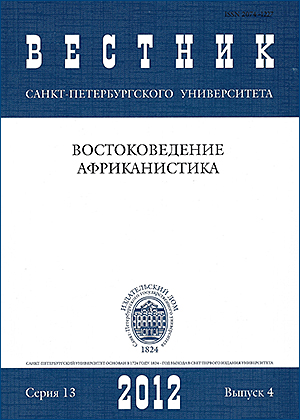Variations of the maqāma canon in the late Middle Ages («The Legal maqāmā» of al-‘Abbās (16th cent.)
Abstract
This article is devoted to the research of the role of maqāma canon in the late Middle Ages and its connection with the aims of traditional Arab edifying literature on the example of an unknown author al-‘Abbās (16th cent.), whose maqāmāt collection is represented in two unstudied similar manuscripts, which have so far gained little academic consideration (B 66 at Saint-Petersburg Institute of Oriental Manuscripts of the Russian Academy of Sciences and N. F. 66 at Austrian National Library). Comparison of «The Legal maqāma» of al-‘Abbās («al-Maqāma al-Fiq╩iyya») and «The Legal maqāma» of al-╟arīrī (11th cent.) («Al-Maqāma al-Far╨iyya»), the plots of which in spite of variations and some differences in details are the same, shows how the content of maqāma genre has been changing depending on the demands of the time and the author’s personal tastes and views. The plot focuses on the hero’s solution of the paradoxical legal riddle, presented in a verse form. Composite structure of both maqāmas is the same, which is especially noticeable at the beginning of the compared texts. Both authors praise the wit and eloquence, the ability to extemporary solve complicated question, — the quality related to the traditional values of the Arab culture, but al-‘Abbās poses different tasks than al-╟arīrī, therefore in outwardly similar plots we find different main characters — one is a witty actor (al-╟arīrī) and the other is moralizer-faqih (al-‘Abbās).
Keywords:
Saint-Petersburg Institute of Oriental Manuscripts, manuscript, Arabic literature, maqāmāt, al-‘Abbās, al-╟arīrī, 16th century
Downloads
References
Downloads
Published
How to Cite
Issue
Section
License
Articles of "Vestnik of Saint Petersburg University. Asian and African Studies" are open access distributed under the terms of the License Agreement with Saint Petersburg State University, which permits to the authors unrestricted distribution and self-archiving free of charge.





